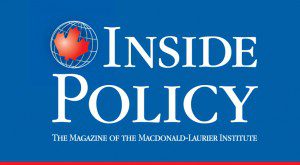 One of the most fascinating aspects of Donald Trump’s wild Republican campaign is the support he has drawn from evangelical Christians, writes Elaine Carsley.
One of the most fascinating aspects of Donald Trump’s wild Republican campaign is the support he has drawn from evangelical Christians, writes Elaine Carsley.
By Elaine Carsley, April 14, 2016
Presidential campaigning has become an exercise in evangelizing America. Evangelicals have asserted themselves as a crucial, vocal, and powerful interest group, whose stamp on politics has become a relevant part of the US presidential campaign discourse. Now more than ever, voters are gravitating toward candidates who radiate Christian values, which is why the 2016 campaign is so completely confusing.
Republican candidate Donald Trump, the fair-weather Christian and popular demagogue who has stood on podiums across America, unabashedly preaching a gospel of self-adulation. As Trump continues to sweep the primaries, stumble through scripture (“Two Corinthians, right? Two Corinthians 3:17, that’s the whole ball game”, and insist he is a proud Presbyterian who will “drink my little wine … and have my little cracker,” he has also taken a somewhat flippant approach to touchier social issues, including homosexual unions and abortion. Trump dismissed the Pope as “disgraceful,” and commented that, “no leader, especially a religious leader, should have the right to question another man’s religion or faith.”
Now more than ever, voters are gravitating toward candidates who radiate Christian values, which is why the 2016 campaign is so completely confusing.
According to Pew Center research, 86% of evangelicals say religion is very important in their lives, 83% say they pray every day, and 52% believe Trump would be a great President.
Trump has likened his pledge to make America great again with a promise to “protect Christians,” because, “Christianity is being chopped away at. Chop, chop, chop”.
New York Mayor Michael Bloomberg said unlike Republican Party founder Abraham Lincoln, “Trump appeals to our worst impulses.” Trump is a volatile representation of style over substance and spirituality, whose semi-declared war on secularism has generated attention — and surprisingly, a lot of support. Evangelicals should, by virtue of their core beliefs, despise Trump — but they do not. And the primary results have demonstrated that Evangelicals have room in their hearts for Donald Trump. “Why do they love me? You’ll have to ask them. But they do. They do love me.”
Although the United States has endeavored toward secularism in government, it has never fully embraced it. God is constantly blessing America, the Pledge of Allegiance makes faith a prerequisite for patriotism, and even the greenbacks boast “in God we trust.”
The primary results have demonstrated that Evangelicals have room in their hearts for Donald Trump.
The story begins on Plymouth Rock, when John Winthrop declared America to be a City upon a Hill. From the Puritans onward, early evangelical underpinnings have equally validated and tormented the America’s consciousness.
Religious fundamentalism hit a few high notes in the 19th century, most of which were discredited because of their partial devolvement into the Ku Klux Klan. Cultural pluralism further marginalized the position of evangelicals for the first half of the 20th century.
During the 1960 campaign, John F. Kennedy famously declared that, “I am not the Catholic candidate for President. I am the Democratic Party’s candidate for President, who happens also to be a Catholic. I do not speak for my church on public matters, and the church does not speak for me.” Kennedy’s campaign could only advance in earnest once he placated the Evangelical base.
Ronald Reagan transformed podiums into pulpits in 1980, convincing voters that the answers to America’s moral decay could be found in the Bible. Whilst President, Reagan earned support from Jerry Falwell and Billy Graham and courted the Moral Majority and the Christian Coalition, organizations that backed his two terms in Office. Washington Post columnist E.J. Dionne Jr. argued that Reagan, more than anyone else, captured the attention of religious traditionalists who “saw the Enlightenment as a wrong turn and saw the destruction of tradition as a grave danger,” which turned out to be an effective election strategy.
As Republican voters and delegates evaluate candidates’ moral fortitude, policy prowess is becoming further sidelined.
The influence of evangelicals on presidential politics grew ever stronger through the 1980s and 1990s and culminated with the election of George W. Bush in 2000. “I believe God wants me to run for President,” Bush said of his candidacy in 2000. “I am driven with a mission from God.” More than anything, Bush cemented the Christian Right’s relevance in presidential politics, again blurring the lines between church and state.
When Trump told Liberty University that, “if separation of church and state is code for attacking religion, I’m not interested,” he was preaching to the already converted. Known for their philosophical opposition to secularism, the Liberty U crowd embraced Trump’s religiosity as a sign of political seriousness.
As Republican voters and delegates evaluate candidates’ moral fortitude, policy prowess is becoming further sidelined, a troubling tale for a country founded on intellectually charged, democratic principles.
Thus we have the Trump paradox. Though many moderates cannot stomach his temperament, there is a strong contingent of Americans that believe Trump — regardless of his pious impropriety — is their guy, because he has the capacity to evangelize America back to greatness.
Elaine Carsley is counsellor-in-chief of collegial. and a lecturer at McGill University and Concordia University. Her doctoral research focuses on the media’s role in American presidential campaigning. She has served as a policy adviser to international companies, local, state and federal governments, and collaborated with prominent North American think-tanks.




